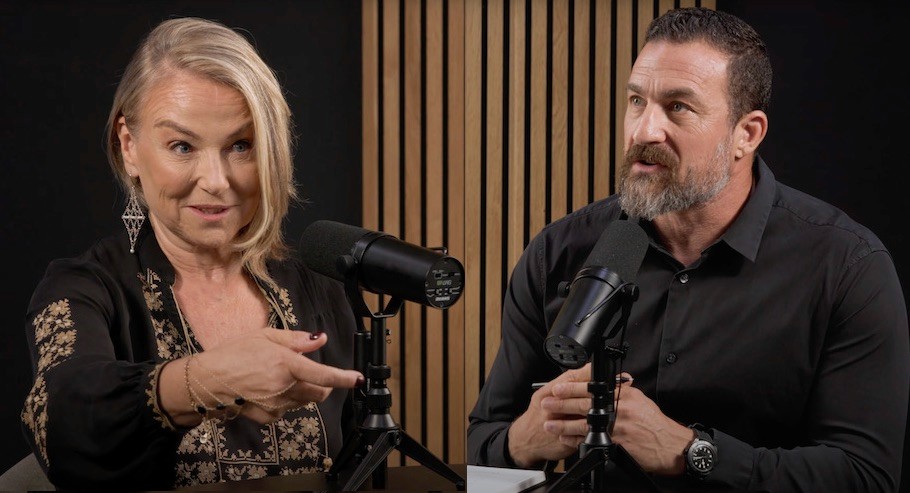Summaries
Esther Perel on Relationships: Summary of Andrew Huberman's Podcast
Oct 18, 2024

🔉 Listen to this article in our podcast episode #1 on YouTube
"Sex is never just sex. It is so much more than the physiological interaction of bodies. What are you really looking for in sex? Is it togetherness, spiritual intimacy, or the opportunity to be vulnerable and surrender safely? Perhaps it's the chance to feel strong and bold in your fantasies, or maybe it's simply a space to enjoy yourself, free from all obligations. Sex is not something you do — it's a state you seek, a coded language to express our deepest emotional needs," says Esther Perel, world-renowned psychotherapist and bestselling author of Mating in Captivity: Unlocking Erotic Intelligence.
In a compelling 2-hour conversation with Andrew Huberman on the Huberman Lab Podcast, Esther Perel shares her expertise on the complex dynamics of relationships. They dive deep into what drives us to pursue romantic partnerships, how to build and sustain a happy marriage, maintain sexual attraction over the years, and understand why people cheat.
Here, we summarize the most fascinating takeaways from their discussion, made possible by Scripsy, an AI-powered transcription and summarization tool.
Esther Perel: How to Find, Build & Maintain Healthy Romantic Relationships
1. Identity in Relationships: Holding on While Letting Go
Perel emphasizes that maintaining one’s identity in a relationship is a delicate balance. Romantic relationships can challenge and change us, pushing us to evolve while requiring us to hold on to certain core aspects of ourselves. This concept of 'holding on while letting go' means that we need to adapt and grow within the relationship while also preserving our individuality and not losing sight of who we are.
“We meet others to find ourselves,” Perel notes, suggesting that the healthiest relationships are those that allow both partners to grow while maintaining their unique identities. In other words, relationships foster closeness and thrive on the space they provide for individual development.
Perel discusses how the challenge often arises when partners seek comfort in each other's stability, only to feel later restricted by it. For example, someone might be attracted to their partner’s reliability and structure but eventually begin to see those same traits as rigid or constraining. This tension between desiring change and fearing it is at the core of many relationship conflicts.
2. The Dynamics of Conflict: Beneath the Surface
Conflict is an inevitable part of any relationship, but Perel believes it's not the content of arguments that matters most—it's the underlying dynamics. She emphasizes that arguments often manifest deeper emotional patterns, like feeling neglected, unappreciated, or unheard.
"Every system straddles stability and change and grapples for homeostasis," Perel explains. Conflict is a natural result of the tension between wanting both security and freedom. In relationships, this means balancing togetherness with individuality, which often results in friction.
Perel advises that an effective way to resolve conflicts is to move beyond surface-level arguments and address the deeper emotional triggers. She also underscores the importance of accountability, where both partners take responsibility for their actions without deflecting blame.

3. Love and Desire: Two Parallel Forces
One of the most intriguing aspects of Perel's work is her exploration of the relationship between love and desire. While these two forces often coexist in romantic relationships, they can also pull in opposite directions.
"Love and desire — they relate, but they also conflict. They’re not one and the same, and they don’t need the same things."
Perel explains that love is built on closeness, care, and security, while desire thrives on distance, mystery, and novelty. These two elements may not always align, which can lead to tension within a relationship. As she explains, "Love and desire — they relate, but they also conflict. They’re not one and the same, and they don’t need the same things."
Understanding this distinction is crucial for keeping relationships exciting and fulfilling over time. Couples who are able to balance the safety of love with the excitement of desire are more likely to sustain a healthy relationship.
4. The Power of Curiosity: The Antidote to Reactivity
Perel highlights curiosity as one of the most important traits in any relationship. She believes that curiosity helps break the cycle of reactivity that often drives conflict. When partners are reactive, they focus on defending themselves and blaming the other. Curiosity, on the other hand, opens up a space for empathy and understanding.
"Curiosity is an active engagement with the unknown," she explains, urging couples to explore each other’s thoughts, feelings, and experiences without preconceived judgments. This could mean asking open-ended questions about your partner's day, their thoughts on a particular topic, or their feelings about a recent event. This mindset fosters emotional growth and allows for more productive conversations about difficult topics.
"Curiosity is an active engagement with the unknown"

5. Apologies and Accountability: The Foundation of Repair
A key theme in the podcast is the importance of apologies in conflict resolution. For Perel, a genuine apology is not just about saying sorry but about acknowledging the other person’s emotional experience. A good apology should communicate, “I understand why you feel this way, and your feelings are valid.”
Equally important is the idea of accountability. Perel emphasizes that partners must take responsibility for their actions without minimizing or deflecting their role in the conflict. Without accountability, apologies can feel empty and repetitive, doing little to heal the relationship.
Conclusion: The Ongoing Journey of Relationships
Relationships, according to Perel, are not static; they evolve as the individuals within them change and grow. Conflict, love, and desire are part of the natural flow of romantic relationships. The key to long-term success is maintaining a balance between these forces and continuously fostering curiosity about one’s partner.
By understanding these dynamics and adopting a mindset of curiosity and accountability, couples can more effectively navigate the challenges of romantic relationships, creating a more satisfying connection.
In this great episode, Perel offers not just theories but actionable insights for those seeking to build, repair, or improve their romantic relationships.
Esther Perel on Romantic Relationships: FAQ
1. What is the role of identity in romantic relationships?
We seek relationships to both discover and challenge our identities. We are drawn to traits in partners that we admire and aspire to embody. However, these very traits can become sources of conflict as we grapple with the tension between desiring change and fearing it. Essentially, we crave expansion but also fear losing ourselves in the process.
2. What are the differences between "Cornerstone" and "Capstone" relationships?
Cornerstone relationships typically form in our early 20s when we are still building our identities. We grow and evolve together, establishing a foundation for life.
Capstone relationships occur later in life when our identities are more established. We seek partners who affirm our existing values and complement our already-built lives.
3. What key qualities contribute to a successful relationship?
Self-awareness: Understanding your strengths, limitations, and patterns of behavior is crucial.
Accountability: Taking responsibility for your actions and acknowledging your contribution to conflicts is essential.
Curiosity: Approaching the relationship and your partner with a genuine desire to learn and explore without attachment to specific outcomes fosters growth and connection.
4. What are the three core dynamics of conflict in relationships?
Pursuer-Pursuer: Both partners engage in attack and escalation.
Distancer-Distancer: Both partners withdraw and avoid confrontation.
Pursuer-Distancer: One partner pursues while the other retreats, creating a cyclical chase.
5. Why is genuine apology so crucial in relationship repair?
A sincere apology not only acknowledges a mistake but also validates the partner's hurt feelings. It demonstrates remorse for the impact of the action, regardless of intent. Accepting an apology involves letting go of resentment and allowing for emotional healing.
6. How can couples navigate the complexities of love and desire?
Love and desire are distinct but intertwined forces. They may complement each other, but attempts to force their complete unification can backfire. Recognizing the unique needs of each, both individually and as a couple, allows for a more fulfilling experience. Regularly exploring individual and shared definitions of love and desire can help couples stay connected.
7. How does one's "erotic blueprint" shape their intimate life?
Our emotional history, especially from early caregiving relationships, profoundly influences our sexual preferences and fantasies. These reflect deeper emotional needs, fears, and longings. Understanding your erotic blueprint requires reflection on how you were loved and how those experiences inform your desires and patterns in intimacy.
8. What is the key to navigating the tension between intimacy and self-preservation?
Intimacy requires getting close without losing yourself, while self-preservation involves maintaining individuality without sacrificing connection. Recognizing your primary fear—abandonment by the other or abandonment of yourself—illuminates how you approach intimacy and manage this delicate balance. Regularly asking yourself, "What makes me difficult to live with?" encourages self-awareness and fosters personal growth within the relationship.
Thank you for reading! Don’t forget to install the free Scripsy Chrome extension to save time on lengthy podcasts and videos, and get transcripts and summaries like this.
